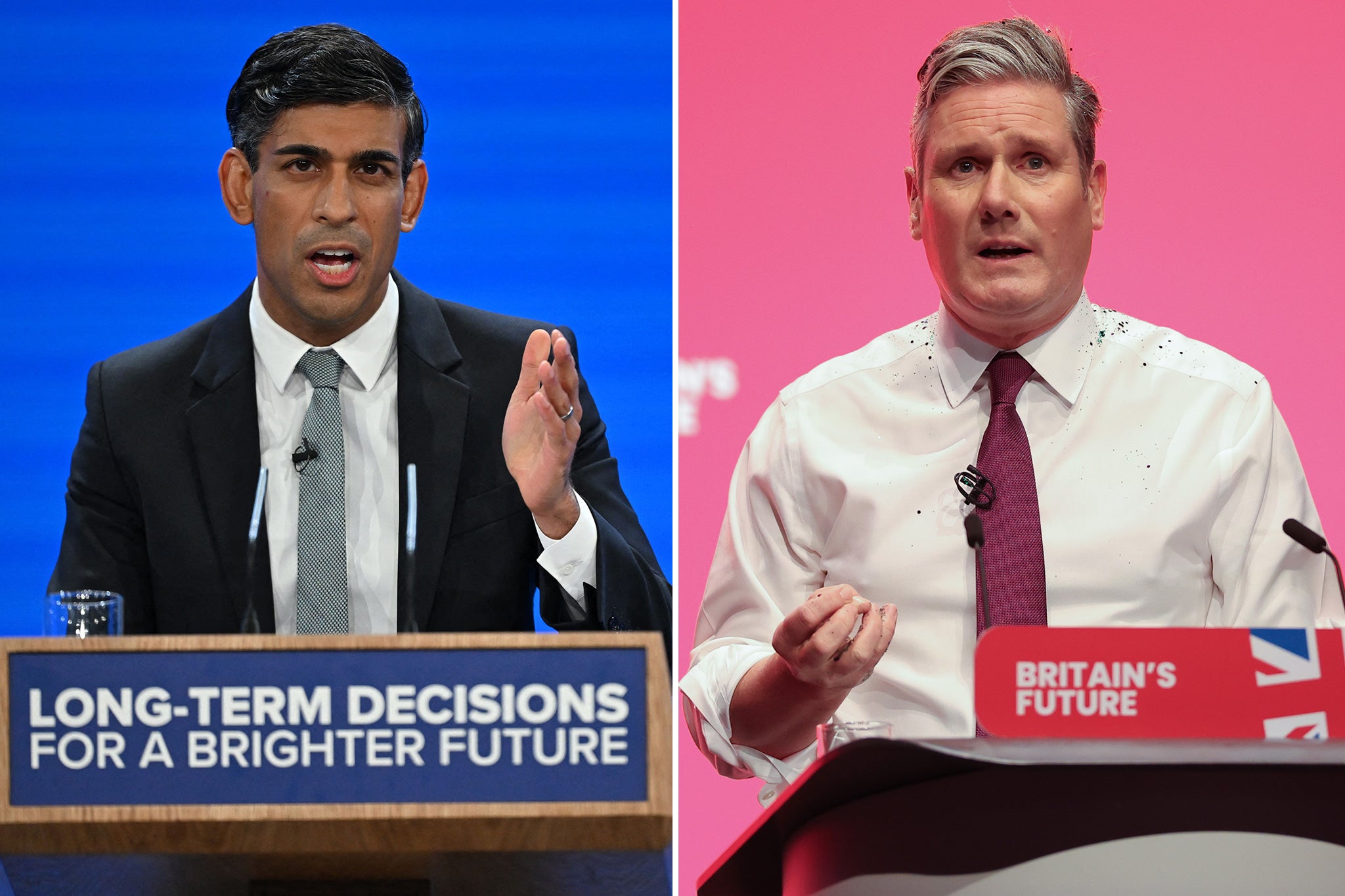Exit Tory strategy, stage right
Unwisely, Rishi Sunak abandoned the centre ground in Manchester, making it easier for Keir Starmer to colonise it in Liverpool. Andrew Grice weighs up the winners and losers of the conference season


Not everything at Labour’s well-choreographed conference went according to plan. The main announcement Keir Starmer had long planned – of a new generation of new towns to enable a Labour government to build 1.5 million new homes in five years – was the subject of an unauthorised leak to The Times in August.
I’m told that the irritation of Team Starmer contributed to Starmer’s decision to demote Lisa Nandy from her post as shadow housing secretary in his reshuffle nine days later. There were also other reasons: he wanted to move Angela Rayner to the post. Nandy allies were bemused by what they saw as the unjustified relegation of one of Labour’s best communicators to the role of non-shadow international development secretary (there is no such Whitehall department to shadow). Despite the leak, Starmer stuck to his plan to make his conference pledge to rebuild Britain in a “decade of renewal”.
His allies say that his response to two unexpected events at the Liverpool conference itself shows he has the mettle to be prime minister. He turned to his advantage the incident in which glitter was thrown over him by a protester as he began his conference speech.
The surprise incursion into Israel by Hamas fighters could easily have wrecked the Labour conference and revived the spectre of antisemitism in the party. Starmer’s aides were jittery. They summoned the party’s already carefully vetted parliamentary candidates and ordered them to stay on message. Starmer’s vanquishing of the left was underlined when figures like Jeremy Corbyn, who couldn’t bring themselves to directly condemn Hamas, attended the rival World Transformed festival nearby.
Other Labour figures told me they were uneasy about Starmer echoing the government’s strong support for Israel, but wouldn’t go public. Such discipline showed that Labour is a party that wants to win.
In contrast, the Tories at their Manchester conference looked like a party that thinks it is going to lose next year’s election, and so instead warmed up for the pitched battle for its ideological soul that will follow.
Rishi Sunak’s conference was not well choreographed. Holding back the one big announcement – cancelling the Birmingham to Manchester leg of HS2 – until his closing speech meant that there was a vacuum, which was filled by Liz Truss, Nigel Farage, and a lurch to the populist right, including Suella Braverman’s warning about Britain facing a “hurricane” of migrants.
Unwisely, Sunak appeared to allow his party to desert the centre ground, making it easier for Starmer to colonise it. The prime minister was divisive, pandering to the Tory core vote, writing off parts of the electorate David Cameron had reached. Starmer’s pitch was unifying and healing, as he reached outwards with a direct plea to disenchanted Tories.
Sunak vacated territory on which the Tories are traditionally strong – such as housebuilding and home ownership – leaving the field clear for Starmer to pitch to under-45s.
The Labour leader was unmistakeably in control of his party, and has won round many of his internal critics, while Sunak was not, and has not.
What’s next? The Tories will desperately seek policies to give credence to Sunak’s claim that he can be the change candidate. There will be more personal attacks on Starmer, but the Labour conference showed that he is more resilient than his opponents think. He stubbornly refused to live up to the Tories’ caricature of “short-term Starmer” who always “takes the easy way out.”
Indeed, Starmer looked more likely to deliver the long-term solutions that Sunak had promised, rejecting “the hope of the easy answer” and choosing “the hope of the hard road”. The Tories should rethink their “change” strategy, but are probably saddled with it now.
Labour must literally build on its “we are the builders” platform by filling in the details of how it would renew the country. One conference speech is not an election strategy, and requires follow-up. Ed Miliband once styled Labour as a “one nation party”, but it was a one-day wonder. If it maintains its opinion poll lead, one real danger for Labour might be complacently avoiding specific manifesto commitments and then being directionless in government, at the mercy of economic headwinds.
It will need a strong retail offer to win positive support, and to persuade voters to turn out rather than abstain through disaffection with politics. “We need to focus on making Keir’s five missions tangible, credible and engaging,” said one Starmer ally.
Shadow cabinet members I spoke to in Liverpool could hardly believe their luck that Sunak had presented himself as the change candidate, saying it had teed up the Labour conference (which, in a break with tradition, followed). Starmer looked like the leader with at least the outlines of a coherent plan; it was hard to detect Sunak’s.
The tale of two contrasting conferences suggests that Labour can credibly offer the change the country wants, while the Tories cannot.





Join our commenting forum
Join thought-provoking conversations, follow other Independent readers and see their replies
Comments